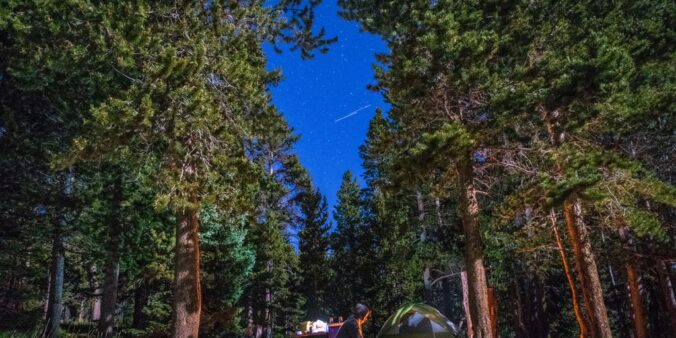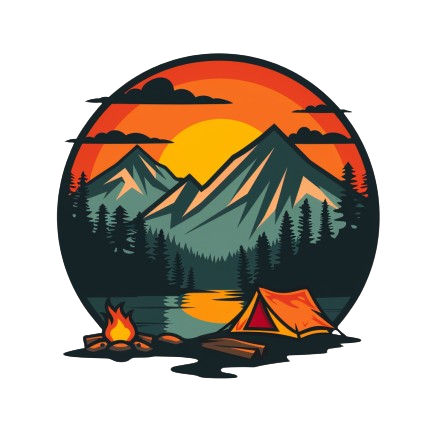Camping in the great outdoors is a fantastic way to disconnect from the hustle and bustle of daily life, connect with nature, and create lasting memories with friends and family. However, even the most experienced campers know that some preparation and clever tricks can go a long way in ensuring a stress-free camping adventure. In this article, we’ll explore ten essential camping hacks to help you make the most of your outdoor experience.
Key Takeaways
- Smart packing, such as using clear bins and creating a checklist, can significantly reduce stress during your trip.
- Setting up a comfortable campsite involves choosing the right tent location and creating a cozy sleeping area.
- Efficient cooking and food storage, like pre-making meals and using waterproof containers, can save time and hassle.
- Staying warm and dry is crucial; layering clothing and using hand warmers can help in various weather conditions.
- Keeping bugs and wildlife at bay ensures a safer and more enjoyable camping experience.
Smart Packing Tips for a Hassle-Free Trip

Packing smart is the first step to ensuring a hassle-free camping trip. Here are some essential tips to help you stay organized and prepared for your outdoor adventure.
Use Clear Bins for Organization
Using clear bins can make it easier to find your gear quickly. Label each bin with its contents, such as cooking supplies, clothing, or first aid items. This way, you can easily locate what you need without rummaging through your entire pack.
Pack Multi-Purpose Items
Save space and weight by packing items with multiple uses. For example, a bandana can serve as a towel, pot holder, or makeshift sling. Multi-purpose items reduce the amount of gear you need to bring, making your load lighter and more manageable.
Create a Checklist
One of the most common sources of stress while camping is realizing you forgot a crucial item. To avoid this, create a checklist of essential items like tents, sleeping bags, cooking gear, and toiletries. Keep this checklist saved on your phone or printed out, and use it to ensure you have everything you need before you leave home.
Finally, don’t forget to pack a few comfort items, such as a book or a deck of cards, to help you relax and unwind after a long day of hiking and exploring. These simple items can make a huge difference in your overall comfort during your camping trip.
Setting Up a Comfortable Campsite

Choose the Right Tent Location
By considering these factors, you can select a campsite that meets your needs and ensures a comfortable camping experience. Look for a site with level ground, shade, and access to water and bathrooms. Choosing the right camping gear and campsite are crucial for a comfortable camping experience.
Use a Tarp for Extra Protection
When it comes to tent camping, comfort is key. Here are a few tips to help optimize your tent for maximum comfort: Place a tarp under your tent to provide an extra layer of protection against moisture and sharp objects. This simple step can make a big difference in your overall comfort.
Set Up a Cozy Sleeping Area
Optimizing your sleeping arrangements, staying warm and dry, and creating a comfortable camping atmosphere can all enhance your comfort. Bring comfortable bedding, like sleeping pads or air mattresses, and warm blankets for chilly nights. Additionally, you can set up a camping kitchen with a portable stove and cookware to prepare hot meals.
Overall, maintaining a comfortable sleep routine while camping requires a bit of preparation and planning. However, with the right gear and a few simple tricks, you can get a good night’s sleep and wake up feeling refreshed and ready to tackle the day.
Efficient Cooking and Food Storage Hacks
Pre-Make and Freeze Meals
One of the best ways to save time and ensure you have delicious meals while camping is to pre-make and freeze your meals. Freezing your meals not only keeps them fresh but also helps keep your cooler cold for longer. Simply heat them up over the campfire or on a camping stove, and you’re good to go!
Use a Camping Stove Windshield
Wind can be a major hassle when you’re trying to cook outdoors. A camping stove windshield can help protect your flame from the wind, making your cooking more efficient. This simple hack ensures that your meals cook evenly and reduces fuel consumption.
Store Food in Waterproof Containers
Keeping your food dry and safe from the elements is crucial. Use waterproof containers to store your food and keep it fresh. This also helps to ensure bugs stay out of your stash. Vacuum sealing your camping food is another great option to save space and keep food fresh for longer.
Efficient cooking and food storage are essential tips and innovative hacks for a seamless camping experience, including gear organization, weather-proofing, comfort solutions, and delicious camping meals.
Staying Warm and Dry in Any Weather

Staying warm and dry is crucial for a comfortable camping experience. Pack extra blankets and clothing made of wool or other insulating materials. A hot water bottle can also provide warmth throughout the night.
Layer Your Clothing
Layering is key to staying comfortable in all types of weather. Pack clothing that can be layered, such as a t-shirt, long-sleeved shirt, and fleece jacket. This will allow you to adjust your clothing to the changing weather conditions.
Keep Your Gear Dry
Waterproof your tent and take extra precautions in wet weather. Use waterproof bags or containers to keep your gear dry. Always have a set of dry clothes stored in a waterproof bag.
Use Hand and Foot Warmers
Hand and foot warmers can be a lifesaver in cold weather. They are small, easy to pack, and can provide hours of warmth. Keep a few in your camping gear for those unexpectedly chilly nights.
Keeping Bugs and Wildlife at Bay
Camping is a wonderful way to connect with nature, but bugs and wildlife can sometimes be a nuisance. Here are some friendly tips to help you keep them at bay and enjoy a more comfortable outdoor experience.
Use Natural Bug Repellents
Aside from lighting a fire and bringing an insect repellent, here are a few more tips to scare off annoying bugs. To protect yourself from ticks, you can create your own, all-natural tick deterrent. Get a spray bottle and fill it with 2 parts water and 1 part tea tree oil. Spray it onto pant cuffs, socks, and shoes. It’s perfectly safe for kids as it doesn’t contain any harmful chemicals. You could even spritz it on your furry companions.
Store Food Away from Sleeping Area
Keeping your food stored away from your sleeping area is crucial to avoid attracting wildlife. Use waterproof containers to store your food and hang them from a tree at least 100 feet away from your tent. This will help keep curious animals at a safe distance.
Keep Your Campsite Clean
A clean campsite is less likely to attract bugs and wildlife. Make sure to dispose of trash properly and keep food scraps to a minimum. Use shower caps to cover your bowls and plates to keep insects off your food. Many shower caps come in a pack of six, so you should have more than enough.
Pro Tip: Burn sage in your campfire to ward off mosquitoes. It’s a natural and effective way to keep those nasty buggers away while making your campfire smell lovely and fresh.
Fun and Practical Lighting Solutions

DIY Lanterns with Headlamps
Transform your headlamp into a lantern by strapping it around a clear water bottle or jug. This makeshift lantern works great anywhere you need ambient light. Whether you need to look for something inside your tent, clean up the picnic table or start a campfire, your night just became a lot easier.
Solar-Powered Lights
Set up fairy lights or solar stake lights around your campsite for easy, dreamy, and highly effective lighting after dark. Place them strategically to create a pathway to the bathroom or mark any highly trip-able objects, like jagged tree stumps or large rocks. Just make sure they’ll get plenty of sun during the day where you place them!
Glow Sticks for Nighttime Visibility
Glow sticks are a fun and practical way to ensure nighttime visibility. Use them to mark tent lines, cooler handles, or even your pets’ collars. They are inexpensive and can be a lifesaver in the dark.
For the best campsite lighting ideas to liven up your outdoor experience, consider combining different types of lights like string lights, solar-powered path lights, and headlamps.
Essential Safety and First Aid Tips
Pack a Comprehensive First Aid Kit
A well-stocked first aid kit is crucial for any camping trip. Customize it based on personal medical needs and include essentials like adhesive bandages, antiseptic wipes, pain relievers, tweezers, and insect repellent. Store them in a small, sealable plastic bag for easy access in case of minor injuries.
Know Basic First Aid Procedures
Understanding basic first aid procedures can make a significant difference in an emergency. Learn how to treat common injuries such as cuts, burns, and sprains. Familiarize yourself with CPR and how to handle allergic reactions. Having this knowledge can be a lifesaver.
Keep Emergency Contacts Handy
Always have a list of emergency contacts readily available. This should include local emergency services, park rangers, and a trusted friend or family member. Make sure your tent is at least 15 feet upwind from grills and fires. Maintain at least 3 feet of clear area around the tent, free from leaves and dry grass.
Safety should always be a priority. Being prepared can help you handle unexpected situations effectively.
When it comes to outdoor adventures, safety and first aid are paramount. Equip yourself with essential tips and knowledge to ensure a safe and enjoyable experience. From handling minor injuries to being prepared for emergencies, our comprehensive guide covers it all. For more detailed advice and expert recommendations, visit our website and make your next adventure safer and more enjoyable.
Conclusion
Incorporating these essential camping hacks into your outdoor adventures allows you to maximize your enjoyment while minimizing stress. Whether you’re a novice or a seasoned camper, these tips will help you make the most of your time outdoors, creating unforgettable memories and a deeper connection with nature. Happy camping!
Frequently Asked Questions
What are some essential items to pack for a camping trip?
Some essential items to pack include a tent, sleeping bag, first aid kit, multi-purpose tools, portable stove, food, water, clothing layers, and lighting solutions.
How can I keep my food safe from wildlife while camping?
Store food in waterproof containers and keep it away from your sleeping area. Using bear-proof containers and hanging food from a tree can also help keep wildlife at bay.
What are some tips for staying warm during cold nights?
Layer your clothing, use hand and foot warmers, and ensure your sleeping bag is rated for the temperatures you will encounter. Additionally, insulating your sleeping area with a sleeping pad can help retain heat.
How can I make my campsite more comfortable?
Choose a flat, dry location for your tent, use a tarp for extra protection, and set up a cozy sleeping area with a good-quality sleeping bag and pad. Bringing along comfort items like a camping chair can also enhance your experience.
What are some effective ways to repel bugs naturally?
Using natural bug repellents like citronella candles, essential oils (such as eucalyptus or lavender), and wearing long sleeves and pants can help keep bugs at bay.
Why is it important to have a checklist before going camping?
A checklist ensures you don’t forget any essential items, helps you stay organized, and reduces stress, making your camping trip more enjoyable and hassle-free.


Leave a Reply